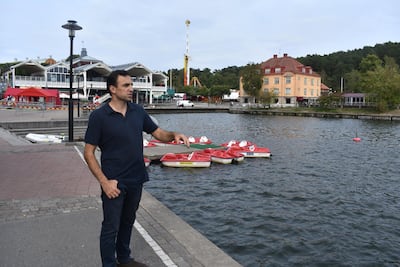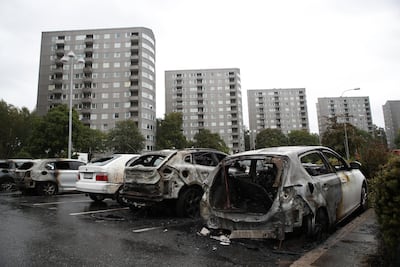After three decades service on Sweden’s railways, Matta Brahim retired to volunteer on the council of Sodertalje’s St Thomas Church and a quiet life helping the transplanted community settle in a peaceful corner of Europe.
The church has become a focal point for the thousands of Assyrians who have fled the Middle East in waves over four decades, most recently in 2014 as the Christian towns and villages of northern Iraq and eastern Syria were gutted by ISIS. The community traces its links to Sweden back to the 1970s, when the pharmaceutical giant AstraZeneca recruited workers for its nearby factory.
When Mr Brahim fled the Iraqi city of Mosul, Sweden’s liberal asylum policies were usually described as the most generous in Europe. The community's identity was not only tolerated but actively encouraged by the state. In government schools, Assyrian children are given two hours of tuition in the Assyrian language every week, while churches and community groups bid for grants, and hold major celebrations for the Assyrian new year.
Sodertalje was often held up as an example, the small city of barely 70,000 taking in more Iraqi refugees than the United States in 2003. More than 50 per cent of the population now hail from immigrant backgrounds, but the city has not been immune to rise of populist anti-immigrant sentiment in the country and much of the western world.
National elections on September 9 are expected to see a strong performance from the Swedish Democrats, who are riding the populist wave flushing through Europe. As recently as the 1990s, many saw the party as synonymous with Sweden’s neo-Nazi movement. Gustaf Ekstrom, the co-founder, volunteered for the SS in the Second World War, while a number of other senior figures played various roles in Scandinavia’s more contemporary Nazi movements.
Current leader Jimmie Akesson has gone mainstream since he took over in 2005, professionalising its workings and fine-tuning its messaging as it became one of the country’s biggest political parties. “They have become more house trained," says Anders Sannerstedt, a political scientist at Lund University.
“The party started out as racists and an extreme party, but they’ve cut the ties to people with racist and Nazi ideas.”

Recent polls have consistently placed them in second place, with between 18 and 24 per cent of the national vote - a leap from the 12.9 per cent they gained at the last election in 2014. The numbers suggest the Swedish Democrats will be kingmaker in the next parliament.
The terms of this general election debate have been hauled into the Swedish Democrats’ stomping ground. Radio and TV segments have been dominated by immigration and crime, something that has left the political establishment floundering to catch up.
One of the more unlikely places the populists have touted for support is within the 150,000 strong Assyrian community.
Mr Brahim, leaning on the church’s rostrum, says politicians from the Swedish Democrats have been allowed to campaign in the church foyer after Sunday Mass. “People are angry that Muslims are coming and getting state permits compared to Christians who lost everything,” he said. “The Swedish Democrats will protect us from the Muslims, they are not against us. Many from my community will vote for them."
Critics say they are playing on the community’s memories of persecution at the hands of militants in the Middle East.
Afram Yacoub, an Assyrian activist originally from the Syrian city of Qamishli, is fearful they are making a serious mistake. “They buy the rhetoric of the Swedish Democrats, they see it as an anti-Muslim party, not an anti-immigrant party. They don’t want to realise that the Swedish Democrats are against all immigrants.
"They say politically correct stuff nowadays, but the core of the party is still pretty near fascism,” he says.
Whether the country’s problems, which include increasingly visible gang violence - one evening earlier this month saw 100 cars torched in the city of Gothenberg - and a stretched healthcare system, entirely boil down to immigration is an argument the Swedish Democrats appear to be winning.
“It’s at the root of everything,” says Tobias Andersson, who leads the Swedish Democrats youth wing.
Some say this shift in debate is a result of the populists' growth, but others say it is as much a response to realities on the ground.
Paula Bieler, an MP and the Party's immigration spokesperson, focuses on the legacy of the peak influx. "The problems have escalated; we are still dealing with what happened in the autumn of 2015", she said, referring to the country's decision to take in 163,000 refugees at the height of Europe's migrant crisis – more per capita than any other in Europe.
Mr Sannerstedt agrees that whilst “the public debate has changed tremendously, this has not just been down to the Swedish Democrats, there has been a lot of attention on all the practical problems of handling the huge inflow of people in 2015, and the problems associated to the huge inflow of migrants”.
Both factors have forced parties across the political spectrum to shift tact, with even the usually immigration-friendly centrist and liberal parties, being forced to take more hard-line approaches to immigration and asylum - one poster from Moderate party bore the slogan: "Deport more criminal foreigners!"
Last week, the Liberal party put out and advert that claimed: “No freedom without security”.
A number of senior figures have come out to refute the sympathetic policies of recent years, most notably on August 23, when former prime minister Göran Persson said it was now necessary to lower “Sweden's generosity to an absolute minimum”.
The far-right has also taken its own steps to change its image. Hundreds of members have been kicked out for everything from racism to openly displaying Nazi sympathies. Party members say there has been serious effort to “cleanse” the Swedish Democrats of their past, yet serious questions linger and scandal have continued to emerge even in recent weeks.
___________
Read more
WATCH: Sightline with Tim Marshall on Sweden's elections
Denmark burqa ban: Muslims defiant as ban on full-face veil takes effect
Nineveh Christians celebrate first Christmas home after ISIL
Swedish politician who said Muslims were ‘not completely human’ resigns
__________
The party leadership acknowledge the 1990s as a chequered period for the party, but they play it down too. “They made a lot of bad decisions. It didn’t matter whether skinheads joined us on demonstrations, but I wouldn’t say that the party had true connections to extreme views,” says Mrs Bieler.
The troubled past no longer has the power to dent the party's momentum, allowing it to capitalise on the collective failures of the established political parties.
Even staunch opponents of the party believe their rise has been facilitated by a failure of the political mainstream to debate sensitive issues. Mr Andersson is a candidate in the election who, at 22, is likely to become one of the country’s youngest MPs. He says voters have begun to resent a political correctness. “They are so politically correct; they’ve been afraid to speak about these issues. The voters are really tired of it."
One statistic dominating headlines in the closing week of the election campaign is that 58 per cent of those convicted of rape in Sweden in the past five years were born abroad. What is also notable is that it came to light following an investigation by public broadcaster STV.
“Five years ago, the media in Sweden would never have investigated the rape issue," says Nuri Kino, an investigative journalist.
The party’s rise seriously worries him, but he concedes: “So many of the problems in our society were hidden, you weren’t able to debate them before the Swedish Democrats.”
“They have become so big because of the failure of the other parties; they have used the fact that so many problems were not publicly debated."
Yet even those supportive of immigration and Sweden’s standing as a safe haven for refugees believe there were faults in the government’s handling of 2015.
Mr Yacoub says there are a great number of success stories from Sweden’s immigrant communities, but concedes “too much immigration at the same time creates problems, and these problems have been exploited politically."
Many parties were reluctant to even discuss issues such as crime and a lack of integration among immigrant communities, he says. “Not speaking openly about naturally occurring problems with new people in a society has caused a backlash.
“They thought we will not talk about [these issues] so we don’t fuel anti-immigrant sentiments, but it did just that, it created anti-immigrant sentiments.”
Despite their growth, a government including Jimmie Akesson remains an unlikely prospect. Hitherto the Swedish Democrats have been kept out of government thanks to a cordon sanitaire adopted by the parliament’s other main parties.
Mrs Bieler believes this may soon have to change. “It’s becoming increasingly unsustainable, and if they try to maintain it, it is the voters who will judge them.”



